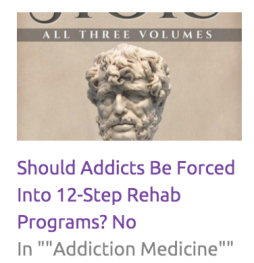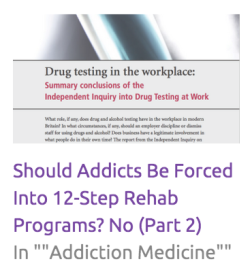Part 3

Contents
I. Evidence regarding the effectiveness of ASAM interventions.
II. Evidence regarding the ASAM patient placement criteria.
III. More about forced interventions (coercion into treatment).
I. Evidence does not support Stuart Gitlow statements
“How To Achieve an 80 Percent Recovery Rate” —Stuart Gitlow, President of the @ASAMorg
How To Achieve an 80 Percent Recovery Rate
Published on October 16, 2012 by Stuart Gitlow, President of the American Society of Addiction Medicine (ASAM). Read the original post via the ASAM President’s BlogRecovery rates over 80% appear to be rather consistently identified both by PHPs and by studies of pilots conducted by the FAA and by independent airlines. These long term recovery rates appear dramatically superior to the recovery rates obtained within the general population, which, depending on what literature you believe, seems to lie somewhere in the 40-50% area. –Stuart Gitlow
No cherry-picking here:
("twelve step"[All Fields] OR "twelve steps"[All Fields] OR "12-step"[All Fields] OR "12-steps"[All Fields] OR "12 step"[All Fields] OR "12 steps"[All Fields]) AND (("ethanol"[MeSH Terms] OR "ethanol"[All Fields] OR "alcohol"[All Fields] OR "alcohols"[MeSH Terms] OR "alcohols"[All Fields]) OR ("alcoholism"[MeSH Terms] OR "alcoholism"[All Fields]) OR ("behavior, addictive"[MeSH Terms] OR ("behavior"[All Fields] AND "addictive"[All Fields]) OR "addictive behavior"[All Fields] OR "addiction"[All Fields]) OR "drug abuse"[All Fields] OR "substance abuse"[All Fields])
II. ASAM patient placement criteria
“physicians have little choice but to cooperate with any and all recommendations if they wish to continue practicing medicine.”
How To Achieve an 80 Percent Recovery Rate
Published on October 16, 2012 by Stuart Gitlow, President of the American Society of Addiction Medicine (ASAM). Read the original post via the ASAM President’s Blog
The September issue of our Journal of Addiction Medicine features an article by JW Boyd and JR Knight discussing ethical dilemmas confronting state physician health programs (PHP’s). Within the article, the authors show concern regarding the coercive nature of the system, specifically indicating that “physicians have little choice but to cooperate with any and all recommendations if they wish to continue practicing medicine. –Stuart Gitlow
The history of Boyd & Knight paper is very interesting.
Help for Doctors With Substance Use Disorders
“If physicians are impaired, they should receive firm but fair treatment”
Published on June 9, 2014 by J. Wesley Boyd, M.D., Ph.D. in Almost AddictedPrior to publication reviewers at 2 different journals said that the issues we raised were very important but that our paper should not be published, essentially because doing so might bring unwanted outside attention to PHPs—one of them wrote that we should withdraw our paper from the journal and instead present our findings to the national federation of PHPs’ annual meeting. –J. Wesley Boyd
III. More information regarding iInvoluntary placement & forced interventions
Discussion started in the 2nd part: Should Addicts Be Forced Into 12-Step Rehab Programs? No (Part 2)
Méndez, Juan E. “Report of the Special Rapporteur on torture and other cruel, inhuman or degrading treatment or punishment.” (2013). Human Rights Council, United Nations.
http://www.ohchr.org/Documents/HRBodies/HRCouncil/RegularSession/Session22/A.HRC.22.53_English.pdf
Fully respecting each person’s legal capacity is a first step in the prevention of torture and ill-treatment. As already established by the mandate, medical treatments of an intrusive and irreversible nature, when lacking a therapeutic purpose or when aimed at correcting or alleviating a disability, may constitute torture or ill-treatment when enforced or administered without the free and informed consent of the person concerned. Deprivation of liberty on grounds of mental illness is unjustified. Under the European Convention on Human Rights, mental disorder must be of a certain severity in order to justify detention. I believe that the severity of the mental illness cannot justify detention nor can it be justified by a motivation to protect the safety of the person or of others. Furthermore, deprivation of liberty that is based on the grounds of a disability and that inflicts severe pain or suffering falls under the scope of the Convention against Torture. In making such an assessment, factors such as fear and anxiety produced by indefinite detention, the infliction of forced medication or electroshock, the use of restraints and seclusion, the segregation from family and community, should be taken into account.
Involuntary placement and involuntary treatment of persons with mental health problems (2012)
http://fra.europa.eu/sites/default/files/involuntary-placement-and-involuntary-treatment-of-persons-with-mental-health-problems_en.pdf
Any restrictions of the rights of the individual must be tailor-made to the individual’s needs, be genuinely justified and be the result of rights-based procedures and combined with effective safeguards.
Related information:
http://www.un.org/disabilities/documents/convention/convoptprot-e.pdf
http://www.blackmentalhealth.org.uk/index.php/expert-opinion-mainmenu-127/669-persons-with-mental-disabilities-should-be-assisted-but-not-deprived-their-human-rights
1. No one shall be subjected to torture or to cruel, inhuman or degrading treatment or punishment. In particular, no one shall be subjected without his or her free consent to medical or scientific experimentation.
2. States Parties shall take all effective legislative, administrative, judicial or other measures to prevent persons with disabilities, on an equal basis with others, from being subjected to torture or cruel, inhuman or degrading treatment or punishment.
Too much coercion in mental health services
http://www.theguardian.com/commentisfree/2013/feb/01/mental-health-services-coercion
Sometimes, coercion of patients may be hard to avoid, but it’s something to which mental health professionals too easily resort
Featured photo: Subbotina “Scream” | depositphotos.com




Reblogged this on Disrupted Physician.
This is enlightening!!!!!
one disturbing thing about inpatient 12 step programs is the manner in which they ignore data. maybe 20 years ago, results came out about some san diego inpat 12 step programs reporting 70% relapse rates for etoh tx. it was pretty much supressed.
reminds of the data on same sex dv, which indicated high rates of dv among gay couples. this data was squelshed when I was working for nimh providing tx to abusers as part of a dod research projoect. the reason for supressing data? it undermined the accepted feminist model that dv was a function of male power and control. interestingly the data just recently became widely available.
oh and the research project i was providing treatment for? it found tx essentially didn’t work. the data was totally ignored by state funding agencies.
mental health tx/substance abuse tx in the country are hugely problematic.
Dear Cindy, thank you for your comments. Please take a look to this database. Kind regards, Jorge.
Ramirez, Jorge H; Langan, Michael (2015): Database: Twelve Step Rehabilitation Programs. figshare.
http://dx.doi.org/10.6084/m9.figshare.1297665
At what point would it be appropriate to appeal to the United Nations
Actually I mean to ask: At what point would it be appropriate for those subjected to such treatments to initiate an appeal to the United Nations Human Rights Council without fear of reprisals? Is that even possible? If not, what is the solution?
Good question, I unfortunately doesn’t know the answer to that, it’s a complex topic indeed.